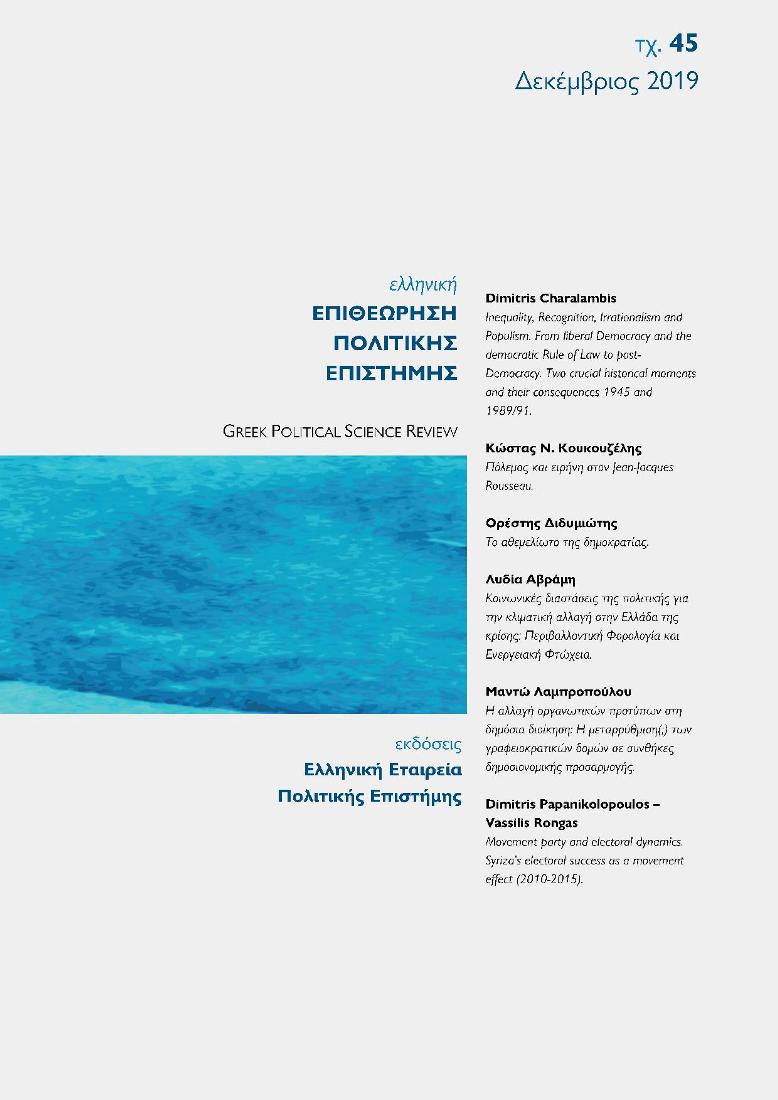Inequality, Recognition, Irrationalism and Populism. From liberal Democracy and the democratic Rule of Law to post-Democracy. Two crucial historical moments and their consequences: 1945 and 1989/91
Аннотация
After the inequality turn of the late 1970s and mainly after the collapse of the Soviet Union deregulation, globalization, hyperconcentration of wealth and private power, oligopolies, monopolies and the dominant position of the financial capital are the consequences of paradigm change from the post 1945 Keynesian consensus to the neoliberal dismantling of the social contract. The end of the heavy industry era, the relocation of production to China and the digital revolution and industrialization 4.0 undermine the classical negotiation between capital and labor leading again to marginalization of social recognition and to oligarchy and transforms the classes dangereuses of the industrial era to classes irrelevantes. The erosion of Democracy and the rise of irrationalism as the systemic rationalization of inequality are the consequences in the declining Western world parallel to the aggressive authoritarian capitalism in China. It seems that the era of the social state between 1945 and the end of the 1970s and mainly after 1989/91 was only a historical intermezzo and that exorbitant inequality reappears as the constituent element of capitalism.
Article Details
- Как цитировать
-
Charalambis, D. (2020). Inequality, Recognition, Irrationalism and Populism. From liberal Democracy and the democratic Rule of Law to post-Democracy. Two crucial historical moments and their consequences: 1945 and 1989/91. Ελληνική Επιθεώρηση Πολιτικής Επιστήμης, 45(1), 7–58. https://doi.org/10.12681/hpsa.22312
- Выпуск
- Том 45 (2019)
- Раздел
- Άρθρα

Это произведение доступно по лицензии Creative Commons «Attribution-NonCommercial-ShareAlike» («Атрибуция — Некоммерческое использование — На тех же условиях») 4.0 Всемирная.
Οι συγγραφείς θα πρέπει να είναι σύμφωνοι με τα παρακάτω: Οι συγγραφείς των άρθρων που δημοσιεύονται στο περιοδικό διατηρούν τα δικαιώματα πνευματικής ιδιοκτησίας επί των άρθρων τους, δίνοντας στο περιοδικό το δικαίωμα της πρώτης δημοσίευσης. Άρθρα που δημοσιεύονται στο περιοδικό διατίθενται με άδεια Creative Commons 4.0 και σύμφωνα με την οποία μπορούν να χρησιμοποιούνται ελεύθερα, με αναφορά στο/στη συγγραφέα και στην πρώτη δημοσίευση για μη κερδοσκοπικούς σκοπούς και με δικαίωμα τροποποίησης μόνο με παρόμοια διανομή (αν αναμείξετε, τροποποιήσετε, ή δημιουργήσετε πάνω στο υλικό, πρέπει να διανείμετε τις δικές σας συνεισφορές υπό την ίδια άδεια όπως και το πρωτότυπο).


